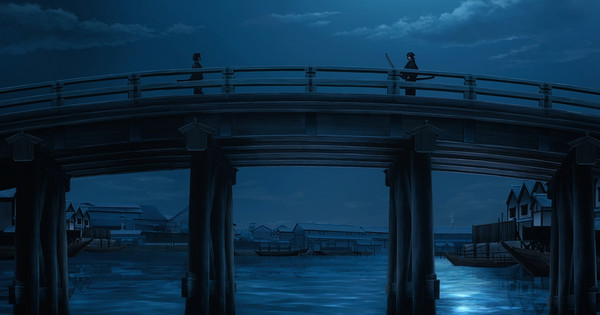Episode 17 – Sword of the Demon Hunter

©Nakanishi Motoo/Futabasha, “Onijin Gentosho” Production Committee
After last week’s touching plot (showing Jinta re-engages with his humanity), this week’s story is a distinctly neat opposite, an opponent who carves the samurai with minimal chaos. The main plot may be also It is neatly staged, centered on a schematic showdown, on an Edo Bridge at midnight, and the postscript is like a serious storytelling wrong judgment. But at least Demon Hunter’s Sword Still very interesting.
Although they are very different from each other, this combines the elements. The crafty Hatakayama reappears and visits Jinta in person at his favorite ramen restaurant. He asks Jinta for help defeating a rogue demon’s base, and he starts killing randomly – but, as Jinta sees, it’s definitely a job that the Lord can handle. There are not many references to Japanese politics this time unless the transmission of Choshu is mentioned, which will play a crucial role in the turmoil of Japan in the late 1860s.
After the last episode, Jinta now has a foster baby daughter, which is his character, perhaps incredibly relaxed, although Ofu and her father may have helped him. Ofu’s comment on Jinta’s “weakness” about cherishing his “weakness” feels like a continuation of the lesson that Fox spirit has brought him such trouble. Unfortunately, once Jinta encounters his new enemy – Psycho-Samurai Kiichi, it all seems to be invalidated, he is killed as his call and abandons interference such as honor or mercy.
The turning point this time is that Geeta not only understands this philosophy, but also embraces it directly, which is the meaning of life, and fewer mortals cannot be distinguished from nihilism. The strongest image of this episode is that Jinta beats him but refuses to end him, the young man laughs furiously in his own blood.
Will the performance follow? It seems unlikely. Kiichi softly spoke of Kiichi’s immenseness on the screen – despite the atrocities he committed were even more disgusting, the three placeholder samurai warriors he killed in the beginning were hard to feel very sympathetic. One obvious way to pursue his “logic” is to let him purify Jinta by irrelevant things like his friend Ofu and daughter Nomari.
Or the performance is real Provocatively, this may suggest how Kiichi’s philosophy anticipates how Japan’s moral code will “develop” in the coming decades, as the country becomes a cruel empire power, ravaging its neighbors no more merciful country than Kiichi – although the narcissist needs neither the emperor or the state to prove his crimes.
I’m skeptical if the show would do anything interesting, especially considering the last flash, this is our first in a few weeks. This suggests that Kiichi will still appear in 2009, making a living as a grocery manager (!), and now friendly with Jinta. Our hero claims that he still respects Kiichi as much as he did in the 1860s, random murders and everyone, while assuring the audience that Jinta values too much human luggage.
The ultimate neat nuance is an insulting vain, a boredom of reluctance to participate in the arguments raised in this episode. I won’t mark this for this which is a failure – in the previous twenty minutes, there was too much meat – but it was disappointing, which reduced my interest in the upcoming plot.
grade:
Demon Hunter’s Sword Currently flowing
Hidive.




